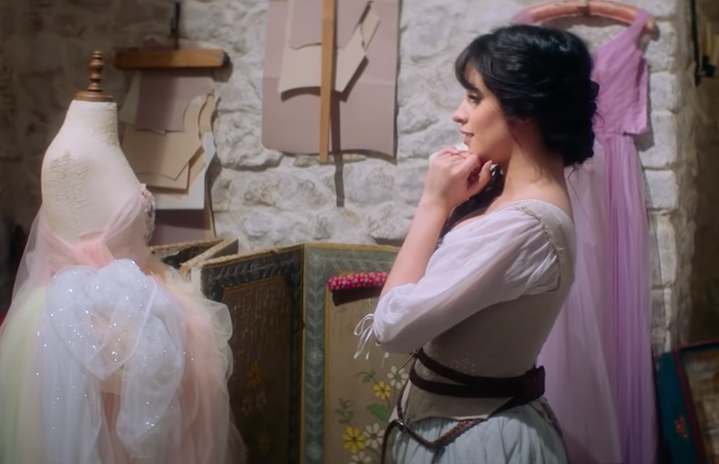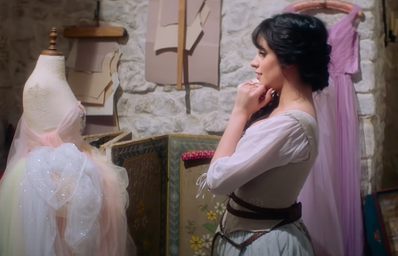The reviews are in, but they are not that promising — Camila Cabello’s Cinderella adaptation doesn’t seem to be as magical as the studio hoped.
Gen Z has always had a love-hate relationship with Camila, but unfortunately, it doesn’t seem like this movie will be changing that. In the film, Camila plays a version of Cinderella who dreams about becoming a dressmaker, and fights back against the patriarchy (and her now not-so-evil stepmother, who was also given a tragic backstory about facing sexism when she was younger). Simply put: Cinderella’s now a girlboss, complete with a super-feminist pantsuit (for, like, two seconds) and a GBF in fairy godmother Billy Porter.
If this was the early 2010s, when entrepreneurs like Sophia Amoruso and Audrey Gelman were all the rage, perhaps this second-wave feminist fantasy might have played differently to audiences. But the girlboss has one foot — if not both — in the grave at this point; it’s been exposed as the empty, corporate white feminism it is (plus, it’s just kind of cheugy). By leaning into this philosophy, Cinderella aimed for feminism and landed somewhere around cringe.
This begs the question, though: Why do we need Hollywood to force-feed us good takes about society? It’s not like we all immediately believe in everything and root for everyone we see on screen. The Gossip Girl reboot took a similar approach to dealing with the original’s classist characters — it now boasts the same wealth and elitism, but this time with a side of privileged guilt because HBO needs you to know that they know classism is bad!
Why do we need Hollywood to force-feed us good takes about society?
What Hollywood doesn’t seem to realize is that there’s no getting around the problematic themes of the movies and shows we loved when we were young. Many have worried about the effects of princess narratives on young children — a 2016 study published by researcher Sarah Coyne at Brigham Young University found that among the 198 preschool-aged children she interviewed twice (one year apart), those who engaged more with Disney Princess media and products were more likely to adhere to “female gender-stereotypical behavior.” However, Coyne published another study in 2021. This time, she interviewed 307 children twice, five years apart — and she found that, unlike in her first study, higher engagement with “princess culture” was associated with more progressive attitudes about women in early adolescence.
It stands to reason that watching the original Cinderella in all its sexist glory as children may have shaped our attitudes around gender and feminism. I can understand why the 2021 Cinderella sought to change that. But as Coyne’s studies reveal, that’s not the entire story. As we grow up, we’re smart enough to engage with Cinderella and other similar media more critically. We can understand that Cinderella shouldn’t necessarily be our role model, and still enjoy the nostalgic magic of “Bibbidi Bobbidi Boo.”
Also, taking on Cinderella is kind of a thankless project at this point; there have been so many adaptations, from Brandy’s version in the ’90s, to Hillary Duff’s and Selena Gomez’s turns in the Cinderella Story franchise, to Lily James’s remake as recently as 2015. All of these movies arguably transformed their Cinderellas into more feminist women; none of them changed anyone’s view on the original all that much. The narrative pushed by Cinderella and its massive legacy isn’t going anywhere, as far as Hollywood is concerned — it’s easier and smarter to teach young girls how to critique what they see on screen, instead of attempting to turn them into little girlbosses and missing the mark entirely.
It’s easier and smarter to teach young girls how to critique what they see on screen, instead of attempting to turn them into little girlbosses and missing the mark entirely.
And what message will the new Cinderella send to kids? That marrying for love is bad, actually, and you should instead spend all your time working toward breaking that glass ceiling (because obviously, women can’t do both at once)? That reducing LGBT+ people to slang and exaggerated stereotypes is totally cool as long as they’re helping you on your quest to gain maximum girl power? For a movie that really wants to be progressive, they’re changing a lot less than they think they are.
Not every movie and show from our youth needs a 2021 “woke” redo. I’m not saying Camila’s Cinderella could’ve been better — I’m saying it wasn’t necessary at all. Just watch the original, and be self-aware that the princess can save herself, too. And if you really want a remake that shows a hardworking Cinderella achieving her personal dreams while also getting the prince, Hillary Duff’s (the best one, IMO) is right there.
Studies Referenced:
Coyne, S., et. al. (2016). Pretty as a Princess: Longitudinal Effects of Engagement With Disney Princesses on Gender Stereotypes, Body Esteem, and Prosocial Behavior in Children. Child Development.
Coyne, S., et. al. (2021). Princess Power: Longitudinal Associations Between Engagement With Princess Culture in Preschool and Gender Stereotypical Behavior, Body Esteem, and Hegemonic Masculinity in Early Adolescence. Child Development.


